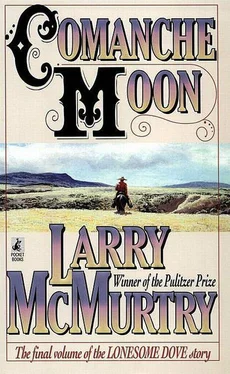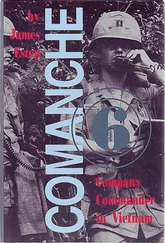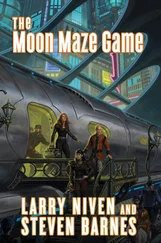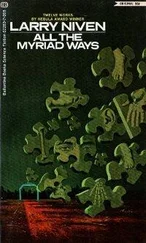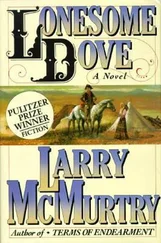It was while he was headed for a place on the caprock where there were many snake dens that the young Comanches caught him. Famous Shoes knew there were Comanches about because he saw the tracks of their horses, but he wanted to go to the snake-den place anyway and look for the hole that led into the earth. He didn't believe his grandmother's story about Old Rock Woman--it was just a way of getting rid of him. He thought his own theory made better sense and he wanted to spend a few days in the place of snake dens, looking for the hole that the Kickapoo people had come out of.
Of course he knew of Buffalo Hump's great raid long before Blue Duck and the other Comanche boys caught him. Six buffalo hunters were the first to tell him about it. They were well armed, but they were hurrying to get north of the Comanche country, out of fear. The Comanches were strong in their pride again--they were apt to kill any whites they encountered.
When Blue Duck and his haughty young friends spotted Famous Shoes they were on their way to try and trade a captive to old Slow Tree. The captive was a white boy who looked as if he had only a few more days of life in him. The young braves ran over and immediately pointed guns at Famous Shoes. They thought he would be better trading material than a white boy who was sick and near death.
"Slow Tree wanted to torture you before, so I will give you to him," Blue Duck told Famous Shoes. Blue Duck was arrogant and boastful; even as his friends were tying Famous Shoes' wrists Blue Duck was trying to impress him with stories of his rapings on the raid. He poked Famous Shoes three or four times with his lance, not deep, but deep enough to draw blood. Famous Shoes didn't bother pointing out to the young man that his father, Buffalo Hump, had told him in front of many warriors that Famous Shoes was to be left alone. Such a reminder might only inflame Blue Duck-- he was of an age to be defiant of his father.
"You should just leave this white boy and let him die," he told Blue Duck, but no one paid any attention. Once they had Famous Shoes securely tied they fell to quarreling about what to do with him--several of the braves wanted to torture him right there. One, a stout boy named Fat Knee, the grandson of old Spotted Bull, thought the best course would be to bury Famous Shoes in the ground, with only his head sticking out, and then ride off and leave him. Fat Knee was afraid of what Buffalo Hump might do when he found out they had delivered the man to Slow Tree--af all, Buffalo Hump had explicitly said he was to be let alone. Fat Knee had seen Buffalo Hump kill men over small disputes--he did not want to be killed over Famous Shoes. His argument was that if they just buried him and rode off, some animal would kill him; Buffalo Hump might never know about it.
"If we bury him good and poke out his eyes he won't last long," Fat Knee said.
Blue Duck was contemptuous of the suggestion-- he was determined to have his way about the disposal of the prisoner.
"We are going to the camp of Slow Tree," he insisted pompously.
So Famous Shoes was put on a horse behind Fat Knee, and the braves hurried on to the camp of the old chief, a camp that lay below the caprock thirty or more miles to the south. Famous Shoes would have preferred to walk; he had never liked the pace of horses very much.
It seemed to him that a man who bounced around on the back of horses risked injury to his testicles--indeed, he had known men whose testicles were injured when their horses suddenly jumped a stream or did something else injurious to the testicles.
But he was a prisoner of several hotheaded Comanche boys. Under the circumstances it would have been foolish to complain. Such boys were apt to change their minds at the slightest provocation.
If he argued with them they might do what Fat Knee suggested, in which case he would be blind and unable to follow tracks that interested him. It was better to keep quiet and hope that Fat Knee didn't jump his sorrel horse over too many creeks.
It was on the days when Ahumado paid him no attention, never once raising his binoculars to the Yellow Cliffso, that Scull came closest to despair. As long as Ahumado watched, Scull could feel that he was in a fair contest of wills. When Ahumado watched, Scull immediately responded. Though he had given up scratching Greek hexameters, or anything else, on the rock wall, he grabbed his file and pretended to be scratching something. If that didn't hold the old man's interest then Scull tried singing. He roared out the "Battle Hymn" at the top of his lungs--then, hoping to puzzle Ahumado, he warbled a few snatches of Italian opera, an aria or two that he knew imperfectly but that might fool the old dark man who sat on the blanket far below him. It was all a bluff, but it was his only chance. He had to keep Ahumado interested in order to stay interested himself; otherwise he was just a man hanging in a cage, eating raw birds and waiting to die. One book might have saved him; a tablet to write on might have saved him. He tried recalling his Shakespeare, his Pope, his Milton, his Virgil, his Burns--he even tried composing couplets in his head; he had always been partial to the well-rhymed couplet. But his memory, stretch as it might, would only get him through two or three hours of the day. His memory wasn't weak, he could snatch back much of the poetry that he had read, and not just poetry either. Lines came to him from Clarendon's History, from Gibbon, even from the Bible. His memory was vigorous and Scull enjoyed exercising it; but he wasn't at war with it and war was what he needed: someone or something to fight. For days he studied the cliff above and below him, thinking he might fight it. But the thought of the dark men, waiting with their machetes, made him hesitate about the climb.
Most of all, what he needed was Ahumado's attention. The Black Vaquero was a man worth fighting--Scull warbled and howled, sometimes yelling out curses, anything to let Ahumado know that he was still an opponent, a challenger, a captain.
Ahumado heard him, too--often he would train the binoculars on the cage. Sometimes he would study Scull for many minutes--but Ahumado was sly. Often he would do his studying while Scull was napping, or distracted by the effort to catch some bird that was nervous and would not quite settle on the cage. Ahumado wanted to watch but not be watched in turn; it was another way of being behind, in a position to surprise his opponent. He was subtle with his attention; perhaps he knew that Scull drew his energy from it.
What Scull wanted was some way to trigger Ahumado's anger, as he had triggered it when he suggested a ransom. Ahumado's hatred would give him something to challenge and resist: not just the endless swinging over an abyss. Confinement induced torpor, and from torpor he could easily slip to passivity, resignation, death. He needed a fight to keep his blood up. He had been three weeks in the cage, long enough to grow sick of the sight and taste of raw fowl--yet long enough, too, that news of his plight might have reached Texas--sch news would travel quickly, across even the most seemingly deserted country. A peon would mention something to a traveller and that single comment would radiate outward, like sunlight.
Soldiers in the northern forts would soon hear of things happening below the border--of course the information might be distorted, but that was to be expected. Even well-informed journalists, writing for respectable papers, were not free of the risk of distortion.
Even now, for all Scull knew, the Governor of Texas might have got wind of his peril; with luck a rescue party might already be on the way.
While rescue was still a possibility, it was all the more imperative that he keep his blood up, which he could do best by reminding the old man on the blanket that he, Inish Scull, was still alive and kicking, still a fighter to be reckoned with.
Читать дальше
